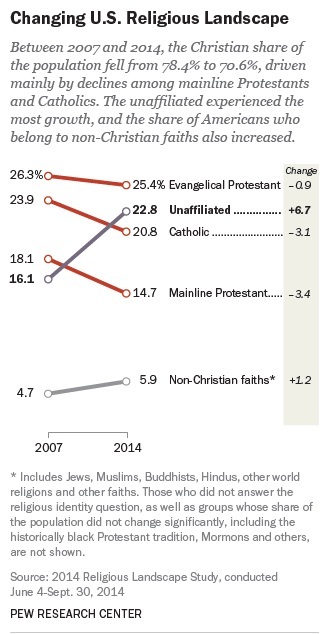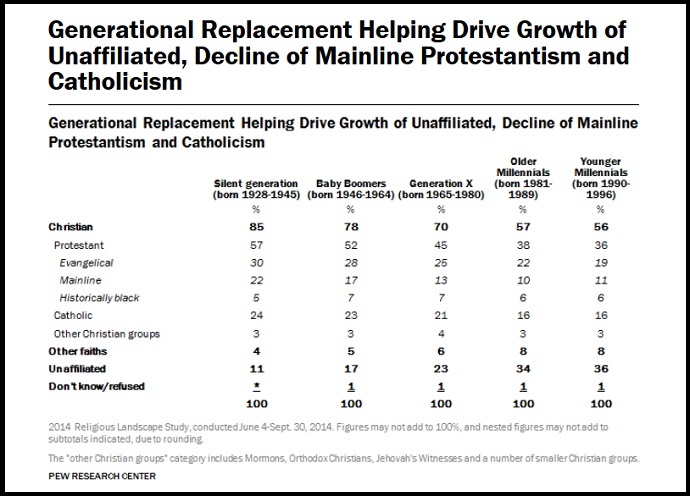Losing my religion:
US Population Becoming Less Christian!
13 May, 2015
Christianity has experienced a sharp decline in Americans
identifying as a member of that religion. Meanwhile, the number
of people belonging to non-Christian faiths is growing, as is
the number of unaffiliated people, according to a new report.
The number of people identifying as Christians in the US has
dropped almost eight percentage points since 2007, from 78.4
percent to 70.6 percent, the Pew Research Center found in its
2014 Religious Landscape Study. At the same time, the number of
unaffiliated Americans ‒ meaning atheists, agnostics and those
who identify as “nothing in particular” ‒ increased more than
six percentage points, from 4.7 percent in 2007 to 5.9 percent
in 2014.
*

* “What we’re seeing now is that the share of people who
say religion is important to them is declining,” Greg Smith,
associate director of research at the Pew Research Center, told
the Washington Post. “The religiously unaffiliated are not just
growing, but as they grow, they are becoming more secular.”
Americans are not as religiously insular as they once were.
The poll found that among Americans who have gotten married
since 2010, nearly four in 10 (39 percent) are in mixed-religion
marriages, compared to 19 percent among those couples who got
married before 1960.
"American religion is as caught up in change and innovation
as any other part of American life," John C. Green, a political
scientist who studies American religion at the University of
Akron and who was an adviser to the study, told the Salt Lake
Tribune. "That's not to say all are happy about it."
The United States' religious makeup is changing as people
readily switch faiths and increasingly marry people from other
traditions, he noted.
The so-called “millennial” generation is the most likely to
be unaffiliated, as the median age of those who don’t identify
with a faith is 36. The unaffiliated are becoming younger in
general, as the median age of that group in 2007 was 38. While
millennials are marrying later than their parents’ and
grandparents’ generations did, they’re not becoming more
religious as they age.
“Some have asked, ‘Might they become more religiously
affiliated as they get older?’ There’s nothing in this data to
suggest that’s what’s happening,” Smith said.
As the young become more secular, the median age of people
belonging to Christian religions is going up. Half of all
mainline Protestants are 52 or older, up from a median age of 50
in 2007. For Catholics, the median age grew from 45 to 49.
* “There’s a continuing religious disaffiliation among
older cohorts. That is really striking,” Smith said. “I continue
to be struck by the pace at which the unaffiliated are growing.”

There are now about 56 million religiously unaffiliated
adults in the US, up 19 million from 2007. Men are more likely
to have left their sect than women.
“It’s remarkably widespread,” said Alan Cooperman, director
of religion research for the Pew Research Center, according to
the Washington Post. “The country is becoming less religious as
a whole, and it’s happening across the board.”
As Christianity shrinks in the US, mainline Protestants and
Catholics are those most likely to have left their faiths.
“That’s a striking and important note,” Smith said. “That
means that there are more than six former Catholics for every
convert to Catholicism. There’s no other group in the survey
that has that ratio of loss due to religious switching.”
Along with secularism, non-Christian religions have seen
increases in their ranks, albeit more modest gains. The overall
non-Christian population increased from 4.7 percent in 2007 to
5.9 percent in 2014. About 8 percent of millennials identify as
members of other faiths.
Islam had the largest increase among the non-Christian
faiths, growing from 0.4 percent of the population to 0.9
percent, followed by Hinduism and other faiths that both had 0.3
percentage point increases. Hindus now comprise 0.7 percent of
the US population, while 1.5 percent of Americans belong to
other faiths ‒ meaning Unitarianism, New Age religions, Native
American religions and others. The largest non-Christian faith
in the US remains Judaism at 1.9 percent of the population.
As the number of religiously unaffiliated people increases,
it may begin to impact the political landscape, not just the
faith-based one. Secular people are more likely to vote for
Democrats, while Christians, especially evangelical ones, make
up the Republican Party’s religious right.
“That, in turn, means that arguments solely based on appeal
to religious authority are not likely to carry the day. And
remember, no one likes a scold,” the Washington Post’s Jennifer
Rubin wrote in a Right Turn blog post.
Republicans need to recognize that others don’t have the same
view of America as a Christian nation, and must make clear that
there is a difference between their faith and their policy
positions, she added.
Pew’s Religious Landscape Studies was “designed to fill the
gap” between religious membership rolls that have no common
criteria and general surveys of the US population that include
only a few questions on faith. It also makes up for the fact
that the US government doesn’t ask Americans about religion
during its decennial census, so there are no official statistics
on religion.
Pew surveyed more than 35,000 Americans between June and
September, with a margin of error of plus or minus 0.6
percentage points. The forum compared its results with that of
its 2007 survey to identify religious trends in the US.
Related Links:
* Americans becoming less religious, especially young adults: poll
* US Christians decrease 5 percent in 7 yrs – poll
* Gallup: Belief God created humans at record low
* Pew: Americans giving up on God, miracles
* The non-religious are now the country’s largest religious voting block
* Millennials May Be The Least Religious Generation
* Why Have Americans Stopped Reading the Bible?
* These are the ‘most godless’ cities in America
* Massive number of U.S. cities abandon Bible
* 27 Facts That Prove That The Family In America Is In The Worst Shape Ever
* 21 Signs That Americans Are the Unhappiest People in the Entire World
*
Brainwashing in America
* Is America Becoming a Pagan Kingdom?